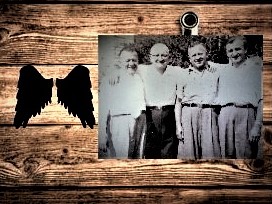
A cousin recently invited me to join an exclusive group dedicated to preserving an old family heirloom—our surname. This cousin is one of those relatives you usually only get to see at weddings and funerals, so the prospect of getting closer to my family’s heritage was irresistible. It promised both the recollection of old family customs as well as the anticipation of generational changes that lie ahead. Bloodlines are biblically important for that very reason. See Genesis 5 in the Old Testament and Matthew 1:2-16 and Luke 3:23-38 in the New.
Also see this Sunday’s Mass readings. The importance of family is tied in with the themes of love and hospitality. In the first reading (Gn 18:1-10a), the care and hospitality Abraham shows to God (disguised as one of three strangers who show up at his door) is rewarded with the promise of a history-making bloodline, beginning with the birth of a son.
Then Abraham got some curds and milk, as well as the steer that had been prepared, and set these before the three men; and he waited on them under the tree while they ate. They asked Abraham, “Where is your wife Sarah?” He replied, “There in the tent.” One of them said, “I will surely return to you about this time next year, and Sarah will then have a son.”
Sarah, well-past child-bearing age, laughs at the prospect—therefore giving this son the name that means laughter–Isaac. Many Bible-readers have joined Sarah in laughing over the circumstances surrounding Biblical-begetting. But when it comes down to what this heritage means to future humans, Paul is as passionately serious about us understanding our genealogy as my cousin is. As Paul tells the Colossians in Sunday’s second reading (Col 1:24-28), he and we are part of the sacred blood line flowing from Christ’s wounds destined to deliver a heritage of love to succeeding generations of humanity.
But now it has been manifested to his holy ones, to whom God chose to make known the riches of the glory of this mystery among the Gentiles; it is Christ in you, the hope for glory. It is he whom we proclaim, admonishing everyone and teaching everyone with all wisdom, that we may present everyone perfect in Christ.
We can only imagine what it must have been like to receive this wisdom directly from the source, as Martha and Mary did in Sunday’s gospel reading (Lk 10:38-42). This passage from Luke echoes the hospitality Abraham showed his visitors in our first reading. The difference is, while Martha is busy preparing an elaborate feast for God in the person of Jesus, Mary is sitting at his feet, receiving an early installment of her inheritance of wisdom. Here we have another of those rare instances where a scriptural passage might inspire laughter. The humor comes from recognizing ourselves in Martha’s childish attempt to get Jesus to take sides in a sibling rivalry.
Martha, burdened with much serving, came to him and said, “Lord, do you not care that my sister has left me by myself to do the serving? Tell her to help me.” The Lord said to her in reply, “Martha, Martha, you are anxious and worried about many things. There is need of only one thing. Mary has chosen the better part and it will not be taken from her.”
I’m looking forward to getting better acquainted with others sharing the legacy of our family name—a name which, in Czech, translates as “angel.” Well, as far as I’m concerned, not all names can be interpreted literally.
–Tom Andel